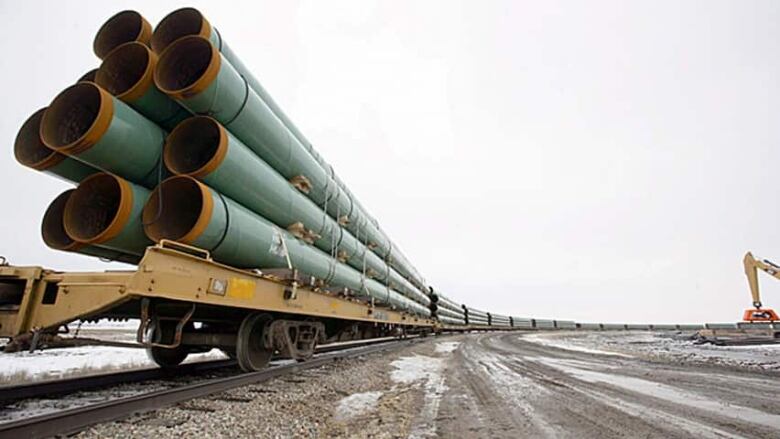Keystone XL access through Nebraska shut down by judge
Oil pipeline faces prospect of more delays because of staunch opposition

The hurdles standing before the Keystone XL pipeline project grew ever taller Wednesday as a Nebraska court dealt the long-delayed project another significant setback.
A district judge ripped up a state law that might have been used to force landowners to allow the pipeline on their property.
As a result, the project could find itself in limbo indefinitely, even if the Obama administration allows the pipeline to cross the U.S. border a key step that is itself by no means certain.
Lancaster County Judge Stephanie Stacy declared unconstitutional a law that had given Nebraska Gov. Dave Heineman the power to push the project through private land.
- MAP | Canada's main pipeline network
- Pipeline map: Have there been any incidents near you?
- Oil: Where Canada stands in the global picture
- Read the U.S. State Department's Keystone XL report (PDF)
Now, unless the law is reinstated by a higher court, Calgary-based pipeline builder TransCanada Corp. might be forced to seek permission from every last landowner on the route.
Further lawsuits seem inevitable, regardless of what President Barack Obama decides.
Stacy stressed that the ruling had nothing to do with the merits of the pipeline and everything to do with the state constitution.
"TransCanada's Keystone XL pipeline has become a political lightning rod for both supporters and opponents of the pipeline, but the issues before this court have nothing to do with the merits of that pipeline," she wrote in the introduction to the ruling.
"The constitutional issues before this court will not require consideration of the current pipeline debate, nor will the decision in this case resolve that debate."
As it stands, TransCanada has settled with landowners in five of six U.S. states through which the pipeline is supposed to pass, as well as with more than two-thirds of the affected landowners in Nebraska.
But a minority have kept fighting, despite skyrocketing offers of compensation.
The company had been offering six times the original price for access to people's property, presumably to line up as many easement deals as possible in the event that Obama approved the pipeline.
'Disagree with the decision'
TransCanada, which has complained it's been losing money as the plan sits idle, had been hoping to get building during this year's construction season.
We are disappointed and disagree with the decision.We will now analyze the judgment and decide what next steps may be taken," said James Millar, a spokesman for TransCanada.
Nebraska GovernorDave Heineman, a supporter of the pipeline, said he supported the decision of the state's attorney general to appeal the ruling.
The southern leg of the pipeline is already operational. But oil must still be transported by rail from Alberta through the northern U.S. before it can be sent by pipeline to refineries on the Gulf of Mexico.
The issue cameup at a North American leaders' summit in Mexico, where Prime Minister Stephen Harper hadsaid he intendedto press Obama to approve the project.
WhileObama acknowledged that the U.S. review has been "extensive," he defended the process, saying "these are how we make these decisions about something that could potentially have significant impact on America's national economy and our national interests
There's a 90-day period during which U.S. government departments can raise concerns about the pipeline, before the State Department makes a final recommendation to the president.
However, administration officials have made it clear that there is no set deadline for State, or the president, to make the final call.
There is some speculation in Washington that Obama might want to delay the politically sensitive decision until after November's midterm elections.












_(720p).jpg)


 OFFICIAL HD MUSIC VIDEO.jpg)
.jpg)



























































































